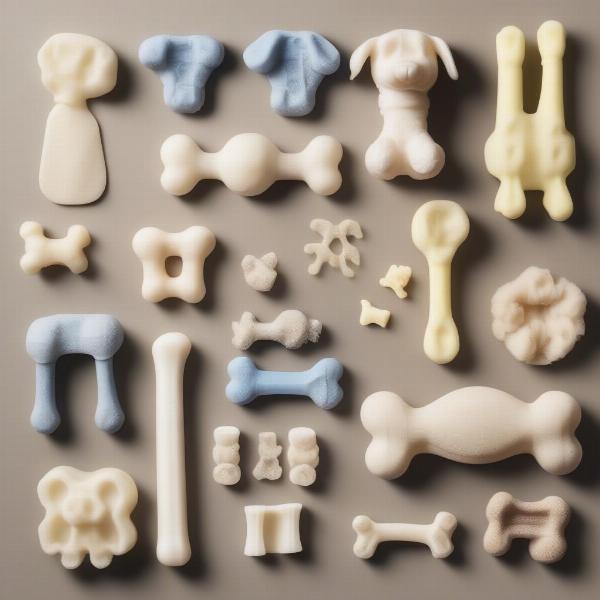Nylon bones are a popular chew toy for dogs, promising durability and long-lasting entertainment. But are they truly safe for our furry friends? This is a question many dog owners grapple with, and understanding the potential risks and benefits is crucial for making informed decisions about your dog’s health and happiness. Let’s delve into the world of nylon bones and explore their safety.
Understanding the Appeal and Concerns of Nylon Bones
 Various nylon bones for dogs
Various nylon bones for dogs
Nylon bones are attractive to dog owners for a number of reasons. Their durability makes them a seemingly cost-effective option compared to quickly consumed rawhide or other chew treats. The hard texture can satisfy a dog’s natural urge to chew, potentially reducing destructive behaviors around the house. Many nylon bones are also flavored, adding an extra element of appeal for dogs. However, several concerns surround the safety of these chews. Some dogs have experienced broken teeth, digestive blockages, and even splintering of the nylon material, leading to potential ingestion hazards.
Potential Risks of Nylon Bones for Dogs
While some dogs can chew on nylon bones without issue, others may experience negative consequences. One of the biggest risks is dental damage. The hardness of nylon bones can lead to chipped or broken teeth, especially in aggressive chewers. Another concern is gastrointestinal blockage. If pieces of the nylon bone are swallowed, they can become lodged in the digestive tract, requiring surgical intervention. Finally, some nylon bones can splinter or break down into smaller, sharp pieces that can irritate or injure the mouth, throat, or digestive system.
Are Flavored Nylon Bones Safer?
Many nylon bones are flavored to make them more enticing for dogs. However, these flavorings can sometimes be artificial and potentially harmful if ingested in large quantities. nylon bones for dogs with natural flavorings might be a slightly better option, but the core safety concerns regarding dental damage and potential blockages still apply.
Choosing Safer Alternatives to Nylon Bones
Fortunately, there are many safer alternatives to nylon bones. Natural rubber toys, for instance, provide a durable and satisfying chew experience without the same risks of dental damage. Rope toys can help clean teeth and satisfy the chewing instinct. Dental chews designed specifically for oral health are also a great option. For dogs that enjoy edible chews, bully sticks, antlers, and certain types of rawhide (always supervised) can be safer alternatives. filled bones for dogs might offer a more palatable and engaging experience than plain nylon. You can also find dog bones uk that prioritize safety.
Conclusion: Prioritizing Your Dog’s Safety with Chew Toys
Ultimately, the safety of nylon bones for dogs is debatable. While some dogs can enjoy them without incident, the potential risks associated with dental damage, internal blockages, and splintering make them a less than ideal choice. Exploring alternative chew toys that prioritize safety and offer similar benefits is crucial for responsible dog ownership. Choosing the right chew toy can contribute to your dog’s overall health and well-being, ensuring they enjoy a happy and safe chewing experience. Always consult your veterinarian if you have concerns about your dog’s chewing habits or any potential health issues related to chew toys.
FAQ
- What are the signs of a blockage from a nylon bone? Vomiting, lethargy, loss of appetite, and abdominal pain are common signs.
- What should I do if my dog breaks a tooth on a nylon bone? Contact your veterinarian immediately.
- Are all nylon bones equally risky? While the risks are similar, the quality of the nylon can vary, affecting the likelihood of splintering or breaking.
- Can puppies chew on nylon bones? Puppies have developing teeth and are more susceptible to damage from hard chews. Opt for softer toys designed for puppies.
- What are some good alternatives to flavored nylon bones? Natural rubber toys, rope toys, dental chews, and edible chews like bully sticks or antlers are safer alternatives.
- How can I tell if a chew toy is too hard for my dog? If your dog’s teeth leave indentations on the toy, it’s likely too soft. If the toy doesn’t give at all, it may be too hard.
- My dog loves nylon bones. What can I do? Gradually introduce safer alternatives and offer them alongside the nylon bone. Over time, you can phase out the nylon bone entirely.
ILM Dog is a leading online resource for dog owners worldwide, offering expert advice on all aspects of dog care and well-being. From breed selection and health care to training and nutrition, we provide reliable, practical information to help you give your dog the best possible life. Our expertise extends to product recommendations, ensuring you have access to safe and effective products like gum for dogs and womens slippers dog. For personalized advice or to learn more about our services, contact us at [email protected] or call us at +44 20-3965-8624. ILM Dog is dedicated to helping you and your canine companion thrive.